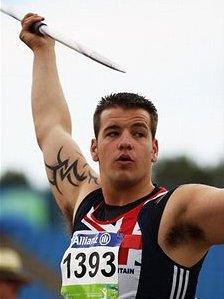Paralympics 2012: Going for gold on a £1m budget
- Published
As an extra £20,000 of funding is announced from Sport Wales, Dame Tanni Grey-Thompson says Wales is reaping the reward of having invested at grass roots level for a long time.
At the last Paralympics, athletes from Wales covered themselves in glory. From a country with only 5% of the UK's population, they made up 16% of the Paralympics GB squad and came home with 25% of its gold medals.
This time round, the squad membership is 38 - two above the target of 36 - and hopes of golden moments are once again high.
The statistics are satisfying to Disability Sport Wales' (DSW) chief executive Jon Morgan, who for the past 10 years has had the job of overseeing an enormous expansion in disability sport provision in Wales, from 1,500 sporting opportunities then to over 1m today.
Dame Tanni Grey-Thompson says Wales punches above its weight in the Paralympics due to its investment in grass roots participation
In 1998, the sums of money involved were trifling. The Federation of Sports' Associations for the Disabled (Cymru), as it was known, had a total of £30,000 to spread around.
Given the current success, one would image he is managing a multimillion-pound operation. So it comes as a bit of a surprise to discover the whole organisation has a budget of about £1m.
On Wednesday, it received a £20,000 boost from funder Sport Wales, the national organisation responsible for increasing participation and improving performance in sport in Wales to boost DSW's coaching.
Mr Morgan explained that £580,000 was lottery funding, which DSW feeds out to the 22 local authority to finance development officers on a part-time basis. Local authorities can choose to make the posts up to full-time.
"Lottery funding has made a real difference not only to fund the officers but to build the framework, set the strategic direction and be very clear over what our measurements are so we can evaluate: are we making a difference?," he said.
"That is effectively the vehicle which kick-starts the community activity.
"Then development officers will be very skilled at identifying other grants, whether it be community funding vehicles, local sponsorship type programmes."
Great Britain's most successful Paralympian, Dame Tanni Grey-Thompson, said it was the long-term investment in grass roots activities that had led to Paralympic success.
"[Wales] marries participation and elite sport - you can't have one without the other," she said.
"I look at the other home countries who don't do that and that's why we have not just the numbers, but we have the medallists."
'Led the world'
Huw Jones, chief executive of Sport Wales, said providing sport for disabled people was taken very seriously in Wales.
"I think the priority that's been given to disability sport... in many ways we have not just led the UK, we've led the world," he said.
"I don't think you will find another country in the world that's invested in sports development officers in every single local authority, and that was absolutely unique when we did that."
A further £225,000 goes to the elite performance academy, which was set up in 2006, the year after London won the bid to host the 2012 Paralympics and Olympics, and a further £60,000 to fund the coaches programme at academy level as and when needed.

Elite athletes such as javelin thrower Nathan Stephens would be eligible for funding while going through the academy structure
Mr Morgan said that equated to around £2,500 per coach. "When you look at the results we get, that's pretty amazing."
There is a £150,000 programme fund used for things like taking squads to overseas competitions, which Mr Morgan described as "a running cost, if you like", £30,000 for a training and education programme and a £15,000 pot to make individual awards to athletes where necessary.
The extra £20,000 from Sport Wales will be used to top up DSW's coaching programmes to ensure "future world-class Paralympians from Wales can be identified and nurtured".
Sport Wales chair Prof Laura McAllister said: "I am extremely pleased to announce this funding increase today of all days.
"We are all poised for another two weeks of enthralling sport in support of our 38 world class Paralympic athletes from Wales."
The remainder of DSW's money goes to office support, says Mr Morgan.
"You can see that the majority of our funding is absolutely dedicated to the frontline delivery service and that's what it should be," he said.
Another area of growing importance is private sector partnership and a "dynamic" marketing strategy.
"Because we're presenting disability sport in quite a different now, we're now got commercial partners on board because they want to be part of what is an incredible story and they're inspired by what they hear and see," Mr Morgan said.
"We're now like other governing bodies in that we have commercial deals. It's not just about the money. We've got people on our board from the commercial sector who bring incredible expertise and knowledge.
"We've got a lot of companies who work with us and if we need something we can pick up the phone and can access private sector resources and thinking, and that's hugely important to sport. That's us growing up as a business, because that's what we are now: we're a sports' business."
He cited the recent provision of two sponsored, DSW-branded cars from a Cardiff dealership as an example of the change in approach and response from the commercial world. The cars provide huge savings on mileage costs at the same time as advertising the organisation and attracting other businesses' attention.
"It sends out a signal that disability sport has really grown up in Wales. We're mature, we're a viable business, we're commercially acceptable, we attract sponsorship."
- Published28 August 2012
- Published28 August 2012
- Published27 August 2012